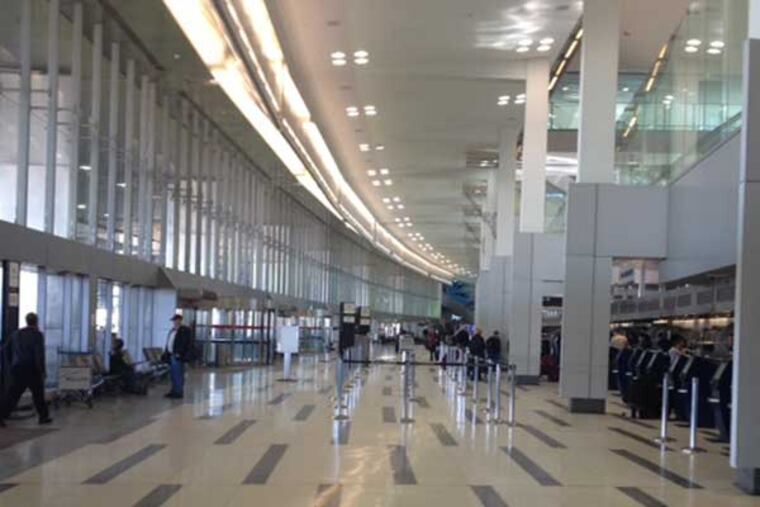GAO report: Phila. could lose role as air hub
A government report suggests that New York City could edge out Philadelphia as a major hub and international gateway in the pending merger between US Airways Group and American Airlines.

A government report suggests that New York City could edge out Philadelphia as a major hub and international gateway in the pending merger between US Airways Group and American Airlines.
The Government Accountability Office (GAO) report says the combined carrier would have five East Coast hubs, "and one could logically think that's too many," its author, Gerald Dillingham, said in an interview.
American's hubs include Miami and New York's John F. Kennedy International Airport. US Airways' hubs are Philadelphia, Charlotte, N.C., and Washington.
"Our intent was to say if history is any teacher when large mergers occur, the merged airline will rationalize or adjust its operations," Dillingham said. "And that could include, as it has in the past, de-emphasizing one hub or another."
The GAO report, released June 19, the day of a Senate subcommittee hearing on the merger, said: "New York could serve as a better hub and international gateway than Philadelphia in the Northeast, while Miami could be a better hub than Charlotte in the Southeast." The analysis offered no data to back up the statement.
US Airways and American executives have said that all nine current hubs would remain, and that Philadelphia would be key because it connects passengers from across the country to major transatlantic destinations.
JFK handles primarily New York-based traffic to international markets such as London.
"The GAO report is rank speculation," Howard Kass, US Airways vice president of legal and government affairs, said Tuesday. "It's not based on facts or an understanding of how the new American network will be built."
The GAO study also said the merger would cut competition on 1,665 airport-pair routes, affecting 53 million passengers. With less competition, airfares could rise on some routes.
American and US Airways have said their merger would have a minimal impact on competition because their networks are complementary, with only 12 overlapping nonstop routes.
The GAO said that the impact would be on connecting flights, those with one stop, and that 530 more airport pairs will lose competition than in the merger of United and Continental Airlines in 2010.
US Airways and American insist that plenty of airlines will still fly many of those routes, and that the combined network would offer more origins and destinations, more travel options for customers, and benefits for communities.
The GAO took no position on the merger.
"We're just saying, take a look," Dillingham said. "Historically, as competition diminishes, the likelihood is that the fares will go up, and the more dominance an airline has at an airport, the more likely the fares will go up as well."
Closing airline hubs is not unprecedented. After the 2005 merger of US Airways and America West, US Airways dumped Pittsburgh. After American acquired Trans World Airlines in 2001, St. Louis lost out as a hub. Delta, after merging with Northwest Airlines, cut operations in Memphis, a former Northwest hub. Delta reduced service in Cincinnati, a former Delta hub.
The good news for Philadelphia is that this region is larger and has more origin and destination traffic - people who begin and end journeys here - than St. Louis, Pittsburgh, Memphis, or Cincinnati did.
"Philadelphia is going to be a tremendous part of the new American," Kass said. "It provides so much connectivity that isn't currently available to American with their existing hub and gateway structure. There is no reason for anything to change."